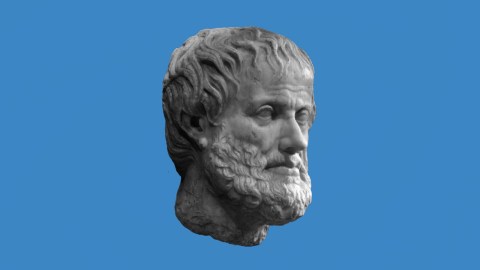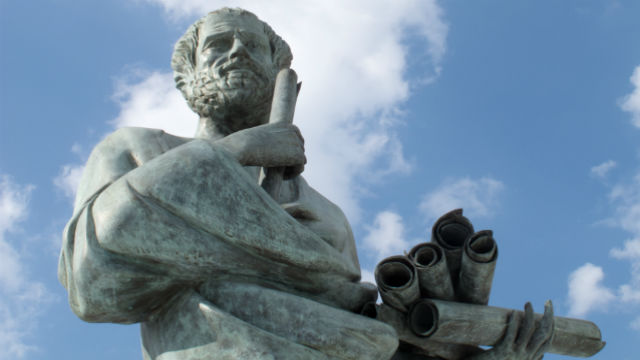Here’s what Aristotle thought it meant to be truly wealthy

- In order to fully understand things, Aristotle believed we need to know the thing’s telos, or purpose. He believed it is natural and good for a thing to satisfy its purpose.
- In terms of money and financial transactions, Aristotle believed only some forms of exchange served a worthwhile, healthy purpose.
- To be wealthy is to have many things to use and enjoy, Aristotle believed.
If you want to understand something, you have to know where it’s going. The ancient Greeks thought that this “end point” — or telos — is what defines everything. It is the very point of a thing or person’s existence — what it’s here on Earth to do.
For a person, this is no easy thing to recognize. Few of us know what we’re “supposed” to do in life, and nobody is quite sure where they’ll end up. As Soren Kierkegaard wrote, “Life can only be understood by looking backward; but it must be lived looking forward.”
With things, the idea of a telos becomes much easier: a boat is to be sailed, a book is to be read, and a beer is to be drunk. It might be that a telos changes from time to time (I might throw my book at you and so make it a weapon). Still, the object is defined by its purpose. This is how Aristotle understood things, and it’s also why he so hated money.
The development of exchange mechanisms
Aristotle was not an historian (and even those Greeks who did call themselves historians weren’t always so hot at it), and so his analysis of “exchange” came from a philosopher’s point of view. He begins with the question: What is the purpose of money? As we’ve seen, this is the only way to fully understand it. According to Aristotle, “exchange” goes through four separate stages:
First, we have basic bartering, or exchanging things for things. For example, Philip goes to the market with a lovely, plump chicken and trades it with Calista for one of her world-renowned knitted caps. Of course, it’s no easy thing to lug chickens around all the time, and not everyone wants a chicken. That’s why money was invented.
Second, we have transactions that are facilitated by money. Philip offers Ismene three silver pennies for her young oxen. Ismene in turn uses one of these pennies to buy a snug knitted cap from Calista. We have a commodity exchanged for money, which is exchanged for commodity.
Third, we have buying low and selling high. This is where people come to market not for things they need, but things they want to sell for a profit. So, Ismene sells her CalistaTM knitted cap for twice as much again in the next city over. Philip sells his young oxen for three times as much when they’re mature and strong.
Fourth, we have usury, or “the breeding of money from money.” Calista, rich from her fashionable yet practical woolen caps, decides to give it up. Instead, she lends people money at a certain price (usually at a percentage of the sum). She doesn’t make or give anything; her wealth simply multiplies without any commodity changing hands.
Natural vs. unnatural money
For Aristotle, the first two forms of exchange are “natural”, and the latter two he calls “unnatural” (it could be translated as “artificial,” but I think “unnatural” captures more of the disapproval he finds in them).
When we’re dealing with bartering and simple transactions, there is a clear goal in mind. It’s a goal that’s necessary to both individuals and society more broadly. That is to say, it gives a person what they want. As Aristotle says, money in this case “is necessary only so far as to satisfy men’s own needs.” This is natural in two senses of the word.
First, it helps us sate those desires that most humans have: clothes, shelter, food, entertainment, and so on. Second, there is a natural “limit” to the purpose. Once the oxen are ploughing a field, or the woolen hat is keeping you warm, the purpose of the money is spent. A need is satisfied, a customer is happy, and there’s an end to it.
But when people start to hoard or collect money for the money’s sake, then it creeps into the unnatural. There is no identifiable purpose to wealth acquisition. There is no final telos to the golden face of greed. Money, as with numbers, has no end point — you just have to get more and more of it. The point becomes clear if we substituted “money” for bread. You’re feeling hungry, and you love a good carbohydrate, so you go out and buy a loaf of bread. This is natural and normal. But if you’re full, or have already a few loaves of bread, yet you continue to buy four, five, six of them, then that would be weird. It would be unnatural. Bread has a purpose for something. Money has a purpose for something.
The good kind of wealth
For Aristotle, this all links to his account of what makes someone “wealthy.” Wealth is not defined by the number of things we have, be that assets or money in the bank. Instead, it comes from having lots of things that are useful to you. It means being able to enjoy various activities because of what you have. As Aristotle writes, “Being wealthy consists in using things rather than in possessing them; for it is the activity and use of such things that makes up wealth.”
As the old saying goes, “you can’t take money to the grave.” Wealth for its own sake serves no purpose. For Aristotle, “pointless wealth” cannot be called wealth at all.
Jonny Thomson teaches philosophy in Oxford. He runs a popular account called Mini Philosophy. His first book is Mini Philosophy: A Small Book of Big Ideas.





